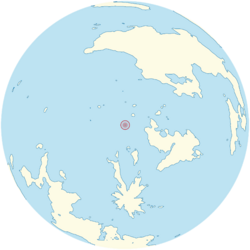Mava
Kingdom of Mava Mailagi'aivu a Mava (A-Mava) | |
|---|---|
| Motto: "Lilata'le Kasakohe a ta Kahaitani'u a Ataina" (Marvanese) "Take Heed of the Leadings of God" Royal motto: "Kaive o Kiano" (Marvanese) "Faith and Truth" | |
| Anthem: Ataina Anakaima'le Mava (Marvanese) "God Bless Mava" | |
 Location of Marva (red) | |
| Capital and largest city | Tonelua |
| Ethnic groups |
|
| Demonym(s) |
|
| Government | Unitary parliamentary constitutional monarchy |
• Monarch | Tatalu VI |
• Prime Minister | Taufiti Paia |
• Assembly Speaker | Vauta Laumasi |
| Legislature | Legislative Assembly |
| Independence from TBC | |
• TBC | TBC |
| Area | |
• Total | 1,734 km2 (670 sq mi) |
• Water (%) | negligible |
| Population | |
• 2020 estimate | 129,220 (TBC) |
• Density | 74.52/km2 (193.0/sq mi) (TBC) |
| GDP (PPP) | 2019 estimate |
• Total | 1.343 billion |
• Per capita | 10,232 |
| GDP (nominal) | 2019 estimate |
• Total | 1.179 billion (TBC) |
• Per capita | 9,120 (TBC) |
| Currency | A-Mava pua (MPU) |
| Time zone | UTCTBC (TBC) |
| Driving side | left |
| Calling code | +218 |
| Internet TLD | .ke |
Mava (/mɑːrvmɑː/), officially the Kingdom of Mava (Marvanese: Mailagi'aivu a Mava) is an island country located in Triania, consisting of two main islands, Mava Nui and Mava Liteli, and a number of smaller rocks and islets. With a total area of 1,734 km2 (670 sq mi), and roughly 120,000 inhabitants, it is one of the smallest sovereign states in the world, in both land and population. The capital and largest city is Tonelua, located on Marva Nui.
Mava is a constitutional monarchy and parliamentary democracy, with Tatalu V as king and head of state. Legislative power is vested in the unicameral Legislative Assembly, from which is appointed the Prime Minister, who serves as head of government. The economy of Mava is dependent on tourism, subsistence agriculture, and fishing. The majority of the inhabitants of Mava are indigenous A-Mava, with a small number of part A-Mava and the remainder largely immigrant workers and retired expatriates.
Etymology
History
Geography
Climate
Government and politics
Mava is a constitutional monarchy with a parliamentary system of government, in which political power is shared between an hereditary monarch and an elected parliament. The monarch, at present King Tatalu VI, serves as head of state, reigning by right of descendence from Tatalu I. Although nominally chief executive and vested with significant constitutional powers, the King is largely a figurehead, but nonetheless possesses certain significant constitutional powers within the government.
Legislative power is vested in the unicameral Legislative Assembly, which is composed of 45 members elected from single-member constituencies every two years. 30 members are elected from Mava Nui and 15 from Mava Liteli. All laws are required to be submitted to the assembly and approved by its members before they are promulgated, with the power of the assembly significantly increasing from a previously rubber-stamp body to a powerful political body. The government is appointed from amongst the largest party or grouping in the Legislative Assembly by the King; the Prime Minister is appointed to head the government.
A-Mava politics continues to be characterised by the dominance of the nobility, with the King's political power leading many observers to characterise Mava's political system as a semi-constitutional monarchy or a "monarchical anocracy". Political figures across parties continue to affirm their allegiance to the King, and policies affecting the King and royal family are largely avoided because of their controversial nature. In recent years, the King has devolved political power to the elected government, although he still formally retains all powers granted in the constitution.
Law
The Constitution of Mava is the fundamental law of the Kingdom of Mava, providing for a government based on the principles of human dignity, democracy, the rule of law, sustainability, and societal cohesion. The A-Mava legal system is based on civil law implemented through a four-level court structure. The first level consists of summary courts, which deal with low-level crimes. The second level consists of criminal courts and district courts, which deal with criminal and significant financial cases respectively. The High Court hears appeals from the criminal and district courts, with the Supreme Court the court of final appeal. The Supreme Court also conducts constitutional reviews.
The judiciary is independent, with political interference explicitly prohibited. Judges are usually appointed for life, but are expected to retire at 75 unless requested to continue. Appointments are made by the King with the consent of the Legislative Assembly. Judges may only be removed by the King on the request of the Minister of Justice by command of the assembly.
Military
The defence of Mava is entrusted to the Royal A-Mava Armed Forces, which consists of the Royal A-Mava Army, the Royal A-Mava Naval Service, and the Royal A-Mava Air Force. The military is governed primarily through the National Defence Act, which provides that the armed forces, in the name of the King, is to defend Mava against internal and external threats, secure and patrol its territorial waters, and provide assistance and relief during times of disaster.
The A-Mava Armed Forces, in its current form, came into existence on 1 May 1951. It was formed through the merger of the separate Royal A-Mava Ground Forces and Royal A-Mava Naval Force, and the creation of an independent air service as a third branch. There are currently around 1,200 service personnel enlisted in the armed forces, with 16 coastal patrol crafts and 3 aircrafts.
Economy
Tourism
Agriculture
Energy
Demographics
Ethnic groups
Languages
Religion
Health
Education
Culture
See also
- Politics of Marva
- Culture of Marva
Notes
- ↑ Unofficial; commonly used.
External links
- Marva. The Global Factbook. United Nations

